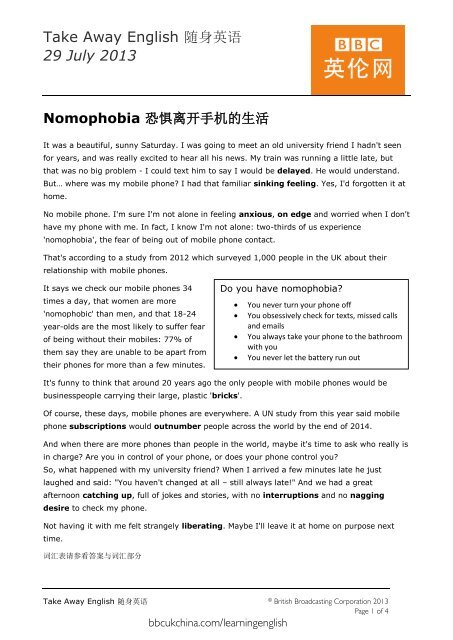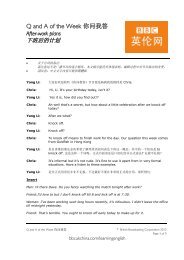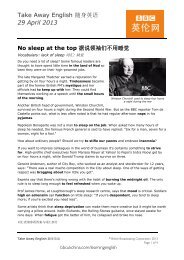Take Away English
Take Away English
Take Away English
Create successful ePaper yourself
Turn your PDF publications into a flip-book with our unique Google optimized e-Paper software.
<strong>Take</strong> <strong>Away</strong> <strong>English</strong> 随 身 英 语<br />
29 July 2013<br />
Nomophobia 恐 惧 离 开 手 机 的 生 活<br />
It was a beautiful, sunny Saturday. I was going to meet an old university friend I hadn't seen<br />
for years, and was really excited to hear all his news. My train was running a little late, but<br />
that was no big problem - I could text him to say I would be delayed. He would understand.<br />
But… where was my mobile phone? I had that familiar sinking feeling. Yes, I'd forgotten it at<br />
home.<br />
No mobile phone. I'm sure I'm not alone in feeling anxious, on edge and worried when I don't<br />
have my phone with me. In fact, I know I'm not alone: two-thirds of us experience<br />
'nomophobia', the fear of being out of mobile phone contact.<br />
That's according to a study from 2012 which surveyed 1,000 people in the UK about their<br />
relationship with mobile phones.<br />
It says we check our mobile phones 34<br />
times a day, that women are more<br />
'nomophobic' than men, and that 18-24<br />
year-olds are the most likely to suffer fear<br />
of being without their mobiles: 77% of<br />
them say they are unable to be apart from<br />
their phones for more than a few minutes.<br />
Do you have nomophobia?<br />
You never turn your phone off<br />
You obsessively check for texts, missed calls<br />
and emails<br />
You always take your phone to the bathroom<br />
with you<br />
You never let the battery run out<br />
It's funny to think that around 20 years ago the only people with mobile phones would be<br />
businesspeople carrying their large, plastic 'bricks'.<br />
Of course, these days, mobile phones are everywhere. A UN study from this year said mobile<br />
phone subscriptions would outnumber people across the world by the end of 2014.<br />
And when there are more phones than people in the world, maybe it's time to ask who really is<br />
in charge? Are you in control of your phone, or does your phone control you?<br />
So, what happened with my university friend? When I arrived a few minutes late he just<br />
laughed and said: "You haven't changed at all – still always late!" And we had a great<br />
afternoon catching up, full of jokes and stories, with no interruptions and no nagging<br />
desire to check my phone.<br />
Not having it with me felt strangely liberating. Maybe I'll leave it at home on purpose next<br />
time.<br />
词 汇 表 请 参 看 答 案 与 词 汇 部 分<br />
<strong>Take</strong> <strong>Away</strong> <strong>English</strong> 随 身 英 语 ©British Broadcasting Corporation 2013<br />
Page 1 of 4<br />
bbcukchina.com/learningenglish
Quiz 测 验<br />
阅 读 短 文 并 回 答 问 题 。<br />
1. How did the author feel when he realised he had left his mobile phone at home?<br />
2. What proportion of British people are afraid of being out of mobile phone contact,<br />
according to the study?<br />
3. Which word was used to describe old mobile phones?<br />
4. Who is more likely to be 'nomophobic'? An 18-year old girl or an 18-year-old boy?<br />
5. Did the author regret not having his phone after meeting his friend?<br />
Exercise 练 习<br />
请 你 在 不 参 考 课 文 的 情 况 下 完 成 下 列 练 习 。 从 每 个 表 格 中 选 择 一 个 意 思 合 适 的 单 词 填 入 句 子<br />
的 空 格 处 。<br />
1. The train was _______ by 17 minutes.<br />
slowed later delayed on time<br />
2. I really enjoy _______ up with friends who I haven’t seen for a long time.<br />
drinking catching talking throwing<br />
3. I feel _______ if I drink too much coffee.<br />
on edge off edge on front on up<br />
4. When I realised I was going to the wrong station I had that _______ feeling.<br />
sinking swimming flying bubbling<br />
5. Mr Bisson's mobile phone was not very fashionable. His colleagues said he had a '_______ '.<br />
window brick stone box<br />
<strong>Take</strong> <strong>Away</strong> <strong>English</strong> 随 身 英 语 ©British Broadcasting Corporation 2013<br />
Page 2 of 4<br />
bbcukchina.com/learningenglish
Answers and Glossary 答 案 与 词 汇<br />
Quiz 小 测 验<br />
1. How did the author feel when he realised he had left his mobile phone at home? He<br />
had a sinking feeling.<br />
2. What proportion of British people are afraid of being out of mobile phone contact,<br />
according to the study? Two-thirds of British people.<br />
3. Which word was used to describe old mobile phones? 'Bricks'<br />
4. Who is more likely to be 'nomophobic'? An 18-year old girl or an 18-year-old boy? An<br />
18-year-old girl.<br />
5. Did the author regret not having his phone after meeting his friend? No, he felt it was<br />
'strangely liberating'.<br />
Exercise 练 习<br />
1. The train was delayed by 17 minutes.<br />
2. I really enjoy catching up with friends who I haven’t seen for a long time.<br />
3. I feel on edge if I drink too much coffee.<br />
4. When I realised I was going to the wrong station I had that sinking feeling.<br />
5. Mr Bisson's mobile phone was not very fashionable. His colleagues said he had a<br />
'brick'.<br />
<strong>Take</strong> <strong>Away</strong> <strong>English</strong> 随 身 英 语 ©British Broadcasting Corporation 2013<br />
Page 3 of 4<br />
bbcukchina.com/learningenglish
Glossary 词 汇 表<br />
delayed<br />
that sinking feeling<br />
anxious<br />
on edge<br />
brick<br />
subscription<br />
outnumber<br />
to catch up<br />
interruption<br />
nagging desire<br />
liberating<br />
被 延 误 了<br />
下 沉 的 感 觉 、 心 神 不 定<br />
焦 急 的<br />
紧 张 不 安 的<br />
大 哥 大 ( 手 机 )<br />
手 机 注 册 的 用 户<br />
在 数 量 上 超 过<br />
了 解 近 况 、 见 面 、 叙 旧<br />
打 断 、 干 扰<br />
挥 之 不 去 的 欲 望<br />
感 到 释 放 的 感 觉<br />
<strong>Take</strong> <strong>Away</strong> <strong>English</strong> 随 身 英 语 ©British Broadcasting Corporation 2013<br />
Page 4 of 4<br />
bbcukchina.com/learningenglish









